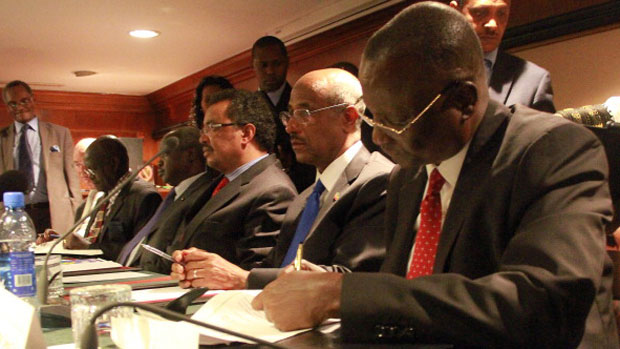South Sudan: government and rebels sign peace deal
Welcomed as 'critical first step' to peace, but critics warn of 'unpredictable' future

A free daily email with the biggest news stories of the day – and the best features from TheWeek.com
You are now subscribed
Your newsletter sign-up was successful
A PEACE deal between South Sudan's government and the rebels who oppose it has brought an end to five weeks of bloody violence in Africa's newest state.
The ceasefire was agreed by representatives of President Salva Kiir and Riek Machar, the rebel leader and former vice president.
The fighting, which was sparked by political tensions, soon descended into ethnic clashes between the Nuer and Dinka communities which left thousands dead.
The Week
Escape your echo chamber. Get the facts behind the news, plus analysis from multiple perspectives.

Sign up for The Week's Free Newsletters
From our morning news briefing to a weekly Good News Newsletter, get the best of The Week delivered directly to your inbox.
From our morning news briefing to a weekly Good News Newsletter, get the best of The Week delivered directly to your inbox.
The peace talks began in the Ethiopian capital, Addis Ababa, almost three weeks ago following intense pressure from regional and international powers, and the pact is expected to be implemented within 24 hours, mediators said.
Conditions of the deal include a monitored end to violence on both sides, the release of political prisoners from both sides, held in the capital Juba, and a timetable for the withdrawal of UN forces from the country.
The agreement will also give unrestricted access to aid workers attempting to deal with the humanitarian crisis caused by the conflict. Thousands of soldiers and civilians have been killed and more than half a million people have fled their homes due to the violence.
The signing of the agreement has been welcomed by international observers with the White House calling it the "first critical step in ending the violence".
A free daily email with the biggest news stories of the day – and the best features from TheWeek.com
However, very few analysts in the region believe that the ceasefire agreement alone will deliver lasting peace.
Without political reform "the long-term outlook is bleak", writes Katrina Manson in the Financial Times. There is also widespread concern that the opposition will be unable to control its different militia factions, the BBC warns.
Seyoum Mesfin, chief mediator at the peace talks, told Reuters that he believes the challenges faced by South Sudan after the war will be "greater than the war itself".
"The process will be unpredictable and delicate," he said.
-
 Local elections 2026: where are they and who is expected to win?
Local elections 2026: where are they and who is expected to win?The Explainer Labour is braced for heavy losses and U-turn on postponing some council elections hasn’t helped the party’s prospects
-
 6 of the world’s most accessible destinations
6 of the world’s most accessible destinationsThe Week Recommends Experience all of Berlin, Singapore and Sydney
-
 How the FCC’s ‘equal time’ rule works
How the FCC’s ‘equal time’ rule worksIn the Spotlight The law is at the heart of the Colbert-CBS conflict
-
 Epstein files topple law CEO, roil UK government
Epstein files topple law CEO, roil UK governmentSpeed Read Peter Mandelson, Britain’s former ambassador to the US, is caught up in the scandal
-
 Iran and US prepare to meet after skirmishes
Iran and US prepare to meet after skirmishesSpeed Read The incident comes amid heightened tensions in the Middle East
-
 Israel retrieves final hostage’s body from Gaza
Israel retrieves final hostage’s body from GazaSpeed Read The 24-year-old police officer was killed during the initial Hamas attack
-
 China’s Xi targets top general in growing purge
China’s Xi targets top general in growing purgeSpeed Read Zhang Youxia is being investigated over ‘grave violations’ of the law
-
 Panama and Canada are negotiating over a crucial copper mine
Panama and Canada are negotiating over a crucial copper mineIn the Spotlight Panama is set to make a final decision on the mine this summer
-
 Why Greenland’s natural resources are nearly impossible to mine
Why Greenland’s natural resources are nearly impossible to mineThe Explainer The country’s natural landscape makes the task extremely difficult
-
 Iran cuts internet as protests escalate
Iran cuts internet as protests escalateSpeed Reada Government buildings across the country have been set on fire
-
 US nabs ‘shadow’ tanker claimed by Russia
US nabs ‘shadow’ tanker claimed by RussiaSpeed Read The ship was one of two vessels seized by the US military